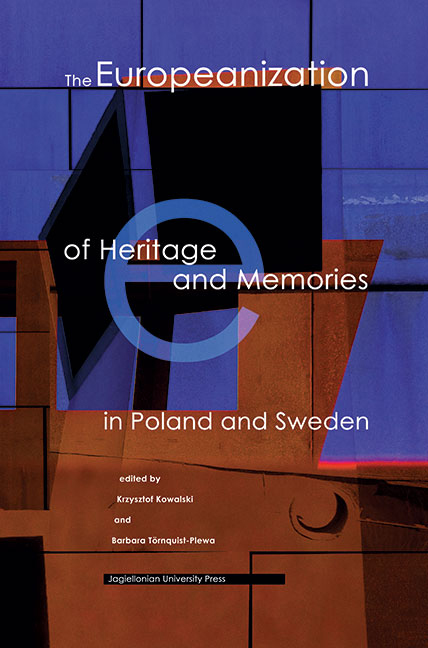Book contents
- Frontmatter
- Contents
- Acknowledgements
- Preface
- PART I European Heritage in the Making
- PART II Redefining the Dramatic Past
- The Europeanization of the Memory and Heritage of the Second World War and the Holocaust in Sweden
- The White Buses. Creating Remembrance of the Second World War in Sweden
- Remembering and Forgetting the Holocaust. The Cases of Jan Karski and Raoul Wallenberg
- The Rise of the Righteous Among the Nations as a New Model for the Polish Hero
- Europeanization at the Memorial Sites of Former Nazi Concentration Camps in Poland. The Cases of Auschwitz, Majdanek and Kulmhof
- Conclusion
- Notes on Contributors
Remembering and Forgetting the Holocaust. The Cases of Jan Karski and Raoul Wallenberg
from PART II - Redefining the Dramatic Past
Published online by Cambridge University Press: 22 December 2017
- Frontmatter
- Contents
- Acknowledgements
- Preface
- PART I European Heritage in the Making
- PART II Redefining the Dramatic Past
- The Europeanization of the Memory and Heritage of the Second World War and the Holocaust in Sweden
- The White Buses. Creating Remembrance of the Second World War in Sweden
- Remembering and Forgetting the Holocaust. The Cases of Jan Karski and Raoul Wallenberg
- The Rise of the Righteous Among the Nations as a New Model for the Polish Hero
- Europeanization at the Memorial Sites of Former Nazi Concentration Camps in Poland. The Cases of Auschwitz, Majdanek and Kulmhof
- Conclusion
- Notes on Contributors
Summary
It is obvious that the increasing interest in the Holocaust during recent decades has been focused on the survivors, or rather the symbol of the survivor. As Peter Novick notes in The Holocaust in American Life, it was “the survivor as emblematic of Jewish suffering, Jewish memory, and Jewish endurance (…) rather than the highly diverse realty of survivors, that made the greatest contribution to Holocaust commemoration.” Mostly, survivors demanded saviors. Hence, the interest in survivors have been closely related to an increasing focus on “the Righteous,” that is those who risked their own lives to save the Jews from the Nazi murder machinery, as well as those who survived thanks to these efforts. If there is any aspect of the Holocaust that could be seen in some optimistic light, it is in the courage of Oskar Schindler, Giorgio Perlasca, Raoul Wallenberg, Jan Karski and other less known and noticed heroes and those who survived thanks to their rescue actions.
In the post-war period, descriptions of Raoul Wallenberg and his work altered considerably. For example, his role as a diplomat in a cloak and dagger-Budapest, filled with spies, hardened Nazis, and mysterious women has sometimes been the preferred narrative. At other times, especially in recent decades, it is his work as one of those who heroically saved Jews from the Holocaust that has received the most attention. In one of the later analyses on this theme, the point of departure is that the line between impartial and humanitarian relief operations and real political security was not always very clear. This was something of which Raoul Wallenberg also became aware. In Sweden, however, it was his disappearance in Hungary in January 1945 and, thereafter, his life as a prisoner in the Soviet Union that was agonizing and the subject of intense political debates for decades. Since his disappearance was closely connected to the sensitive relationship with Sweden's powerful Soviet neighbor, the post-war Swedish history of Raoul Wallenberg is both a tale of attention and silencing. The silence was in part institutionalized since the Soviet-Swedish exchange was to be known in Sweden as “silent diplomacy,” i.e. the Swedish government consisting of Social Democrats believed that it was necessary to uphold, at least on paper, a strict nonalignment policy.
- Type
- Chapter
- Information
- Publisher: Jagiellonian University PressPrint publication year: 2016



